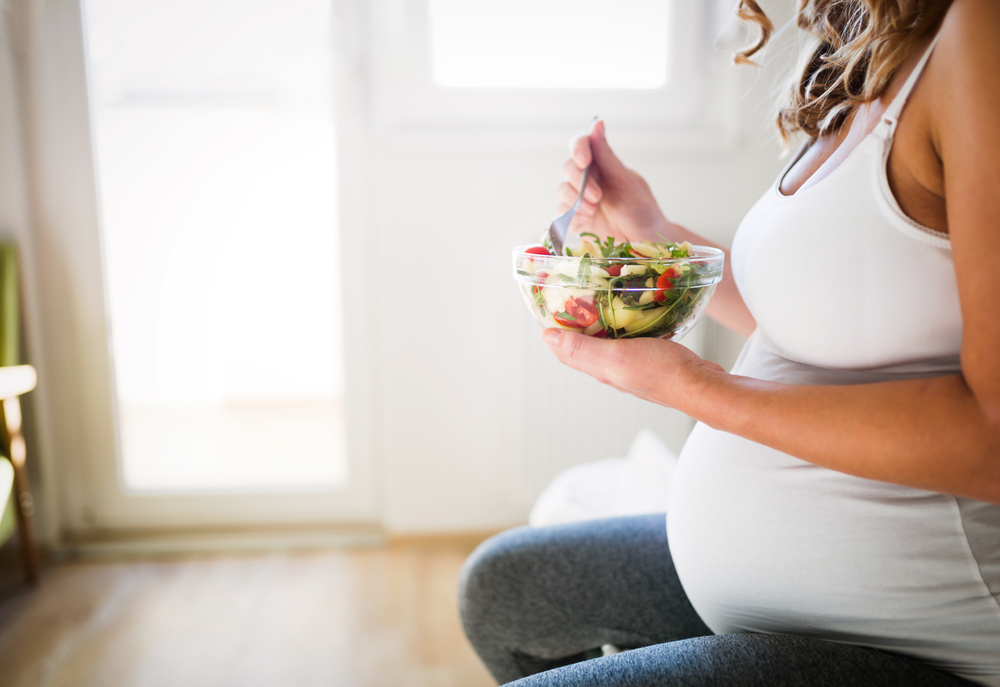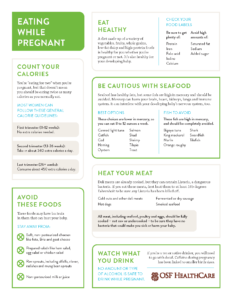
What to eat and what not to eat when pregnant
When you’re pregnant, there are usually plenty of people in your life ready to give you dietary advice. It’s common to be fed bad advice based on inaccurate information, old wives’ tales or one person’s experience.
But you just want information you can trust about pregnancy nutrition. So, how do you know what to eat and what not to eat when pregnant?
Your diet doesn’t change in the first trimester, necessarily. You should still consume the same number of calories. You still should make it a priority to eat from the main food groups: vegetables, fruits, whole grains, protein foods and dairy.
“So as long as you’re eating a balanced diet from all of those food groups, you’re ikely getting all the nutrients you need to support your first trimester of pregnancy,” said Rebecca Copeland, clinical dietitian, OSF HealthCare.
Picking foods to eat when pregnant – first trimester
For your first trimester, the number of calories you need every day actually doesn’t increase. You may be officially “eating for two,” but your developing baby doesn’t need any calories from you, yet.
Looking for great, healthy recipes?
During the first trimester, it may actually be a little tougher than normal for you to consume as many calories as you typically do. That’s because the first trimester is when most pregnant women experience nausea and aversions to certain foods and smells.
You want to try to follow a healthy, balanced diet high in vegetables and fruits, lean proteins and carbohydrates from whole grain foods. This kind of diet is ideal for everyone, whether pregnant or not, because it ensures your body – and that of your developing baby – receives the proper vitamins and nutrients.
“While it would be a good idea to try to eat nutritionally balanced and healthy, it might not be possible,” Rebecca said. “So do your best in the first trimester. Physicians usually recommend you eat a little bit more often in the first trimester. You would think that if I eat less often I won’t get as sick, but if you eat more often you actually can stave off some of that extreme nausea and vomiting.”
You also need plenty of calcium, which is in dairy products. If you are lactose intolerant, or just don’t like dairy, you can get calcium from dark leafy green vegetables, sesame seeds, chia seeds and nuts, such as almonds and hazelnuts.
Red meats and dark leafy vegetables are also great iron-rich foods for pregnancy.
Picking foods to eat when pregnant – second and third trimesters

Pregnancy eating guide
Download
Beginning with the second trimester, you need to increase your daily calories, but perhaps not as much as you might expect. In the second trimester, you need about 350 extra calories per day, and during the third trimester, you need about 450 calories per day above normal.
“Of course, we want you to fill those extra calories with nutrient dense foods,” Rebecca said. “So that would be things like lean proteins, nuts, seeds and whole grains and things that are going to give you lots of extra vitamins and minerals to support a healthy pregnancy.”
Foods that induce labor?
Some persistent myths about eating during pregnancy involve foods – dates, pineapples and unripe papaya, for example – that allegedly induce labor. These myths drive expecting mothers to avoid those foods early in the pregnancy, to avoid going into labor before their baby has developed. Then, they often eat these foods late in pregnancy to try to get labor going.
Unfortunately, there is no solid evidence that any food induces labor for all people.
“When you research it, there might be some anecdotal evidence that a food did that for one person,” Rebecca said. “But unless we can prove it does on a recurring basis or repetitively in research, we can’t really give that recommendation one way or the other.”
Is seafood OK to eat?
The idea that you can’t eat seafood during pregnancy is a very common myth. Fish is a great source of lean protein and fatty acids that are great for your baby’s brain. While pregnant, you are encouraged to eat two or three portions of fish per week, which equals 8-12 ounces. If you don’t like fish, you can take a DHA supplement, instead.
What is extra important when you’re pregnant is making sure you avoid seafood with high levels of mercury, which is bad for you and the baby. Canned light tuna, catfish, cod, oysters, salmon, shrimp and tilapia are among the fish with typically lower mercury levels, making them safe to eat while pregnant.
Larger fish that mainly eat other fish tend to have higher mercury levels and should be avoided. That includes bigeye tuna, marlin, shark, swordfish and others.
Foods to avoid during pregnancy
It’s important to know what not to eat when pregnant because your choices no longer affect only you. When you’re pregnant, you need to avoid foods that can harbor bacteria like listeria and cause foodborne illnesses.
“A healthy, non-pregnant person may have only mild symptoms of a foodborne infection,” Rebecca said. “But for a pregnant woman, if they get that foodborne illness, it can negatively affect the baby, as well.”
To avoid foodborne illnesses, pregnant women should avoid:
- Lunch meat or deli-style meat
- Soft cheeses, like Brie and feta
- Soft-cooked eggs
- Unpasteurized dairy
- Prepared salads like ham salad, egg salad or chicken salad
- Raw sprouts, including alfalfa, clover, radishes and mung bean sprouts
If you do plan to eat deli meats, hot dogs, dry sausage or smoked seafood, heat them up to at least 165 degrees Fahrenheit to kill off any bacteria first.
Drinks to avoid during pregnancy
No amount or type of alcohol is safe to drink while pregnant.
If you drink coffee or tea, you will need to limit your caffeine intake to no more than 200mg or a cup or two of coffee each day. Caffeine during pregnancy has been linked to smaller birth sizes for babies.
How to avoid midnight snacking
“A lot of pregnant women get up overnight to use the restroom and report feeling excessively hungry,” Rebecca said.
So what can you do?
When you wake up overnight and you feel very hungry, Rebecca suggested drinking some water first to see if maybe you’re simply thirsty. Otherwise, having a protein-rich bedtime snack is a good way to try to prevent overnight hunger.
“Have something that’s not going to cause heartburn,” Rebecca said. “Try to eat your snack a half hour before you lay down so you give that food some time to digest, and make it a good combination of a protein source with a little bit of carbohydrate. The combination of those two keeps you feeling full and satisfied for a longer period of time. It takes a little bit longer to digest.”
Peanut butter on whole wheat toast fits the bill, for starters.
And remember, you should talk with your OB/GYN before making any dietary changes during pregnancy.